Without hyperbole, we may have just witnessed the best cyclist ever dominate the Tour de France.
On Sunday, Tadej Pogačar won his sixth stage of the 2024 Tour de France, along with his third yellow jersey. It’s easy to forget that the Slovenian superstar is only 25-years-old, and his full potential is probably a few years down the road.
Pogačar won the final time trial in Nice, close to his residence in Monaco. And, he won the time trial handily, putting one minute and three seconds into Jonas Vingegaard and one minute 14 seconds into time trial world champion Remco Evenepoel. It was Pogačar’s third stage win in as many days, and he made it look easy.
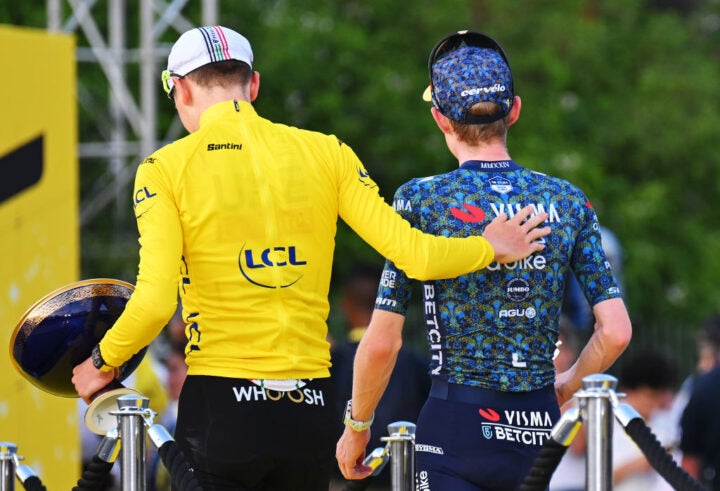
He signaled to his team car a few times and may have waved to the crowd at some point. I’m not sure we ever spotted a grimace on his face, and from the power estimations, it’s clear that he wasn’t going all-out. In this article, we’re going to take a closer look at the numbers from the third week of the Tour de France.
Would Pogačar repeat his 7w/kg performance on Plateau de Beille? Let’s dive into the numbers.
Stage 19 – Pogačar Dominates on Isola 2000
Matteo Jorgenson led the breakaway onto the slopes of the Isola 200 at the end of Stage 19. The 16.1km climb with an average gradient of 7.1 percent was going to be another 40-minute power test for the best cyclists in the world.
The pace had been extremely high all day, and Derek Gee had burned over 3,500 kJs by the base of Isola 2000. Gee had done a pre-TDF altitude camp in Isola, and so had Tadej Pogačar. Both riders had ridden Isola 2000 tens of times, so they knew exactly what to expect.
UAE Team Emirates ripped the peloton apart in the first few kilometers of Isola 2000, and it was only a matter of time before Pogačar attacked. The Slovenian launched early, immediately putting Jonas Vingegaard and Remco Evenepoel on a gap. Pogačar spun a high cadence as he powered away from the rest of the Tour de France and towards the stage win. It was heartbreak for Jorgenson, who was caught less than 2km from the finish line.
After doing ~7w/kg for 40 minutes on Plateau de Beille, Pogačar pushed ~6.8w/kg for 37:37 on Isola 2000. He made the climb look easy.
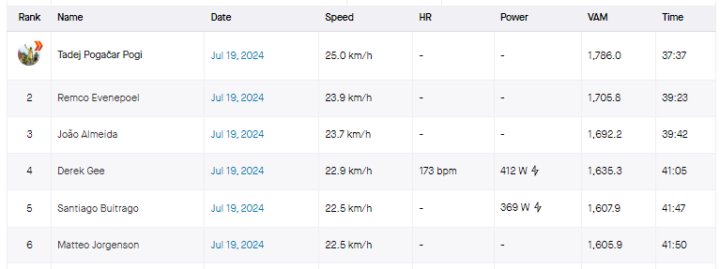
Pogačar – Isola 2000
Time: 37:37
Estimated Average Power: ~435w (~6.8w/kg)
Gee: 41:05 at 412w (5.8w/kg)
Vingegaard and Evenepoel finished one minute and 42 seconds behind Pogačar on Isola 2000, and it looked like the Tour de France was over. But Vingegaard insisted that he would never give up, and there was another massive mountain stage the next day.
Stage 20 – Pogačar and Vingegaard Duel on Col de la Couillole
The final mountain stage of the 2024 Tour de France covered 133.5 kilometers from Nice to Col de la Couillole. It was a near carbon copy of Stage 19’s final climb — instead of 16.1km at 7.1 percent on Isola 2000, the Col de la Couillole was 15.8km at 7.3 percent.
There was plenty of climbing beforehand, but it will all come down to a ~40-minute effort on the final climb. It’s clear that Pogačar worked on his 40-minute power over the winter because he’s produced the highest w/kg numbers we’ve ever seen.
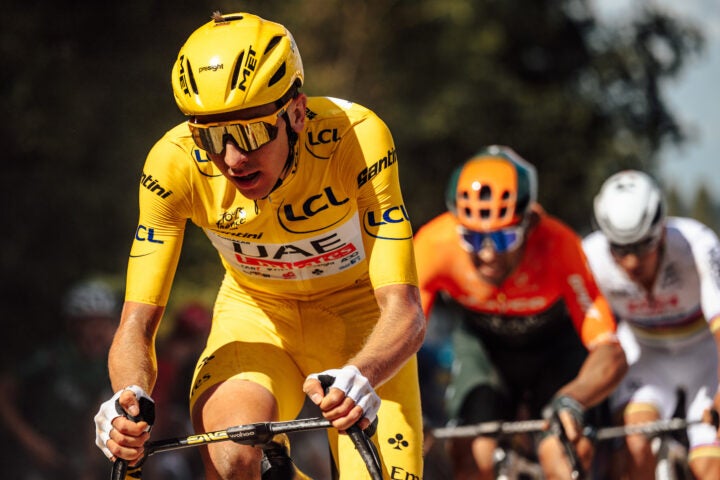
But it was Soudal Quick-Step who took the lead on the early slopes of the Col de la Couillole. Evenepoel attacked with more than 8 km to go but immediately stopped when he saw Vingegaard and Pogačar on his wheel. When he attacked a few kilometers later, Vingegaard went straight over the top and dropped the Belgian.
Now, it was mano a mano, just Vingegaard and Pogačar. The duo caught the breakaway of the day, but it was always going to come down to the winners of the last four Tours de France. Some thought that Pogačar would give the stage win to Vingegaard, but those thoughts were put to rest with 150 meters to go when Pogačar sprinted away to victory.
Of the major mountain stages in this Tour, Pogačar’s triumph on the Col de la Couillole was one of his easiest. The 25-year-old was able to save energy in Vingegaard’s draft, and he was an estimated 30w below his peak 40-minute power.
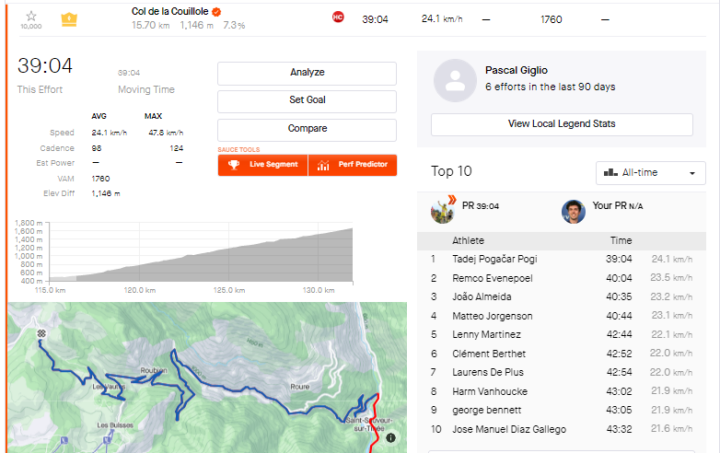
Pogačar – Col de la Couillole
Time: 39:04
Estimated Average Power: ~415w (~6.5w/kg)
Gee: 41:45 at 412w (5.8w/kg)
Stage 21 – Pogačar Crushes Everyone in Nice
Leading by more than five minutes in the GC, Pogačar could have taken it easy and still won the Tour de France. But of course, he was still going to ride full gas in the final time trial around Monaco and Nice. In fact, Pogačar probably rode at 90-95 percent, and he still won the time trial by more than a minute.
The UAE Team Emirates rider was making hand gestures to his team car during the TT, and you could tell that he was soaking up the Tour de France atmosphere. Nevertheless, Pogačar was the fastest rider in stage 21 of the Tour de France—not just on the climbs but also on the downhills.
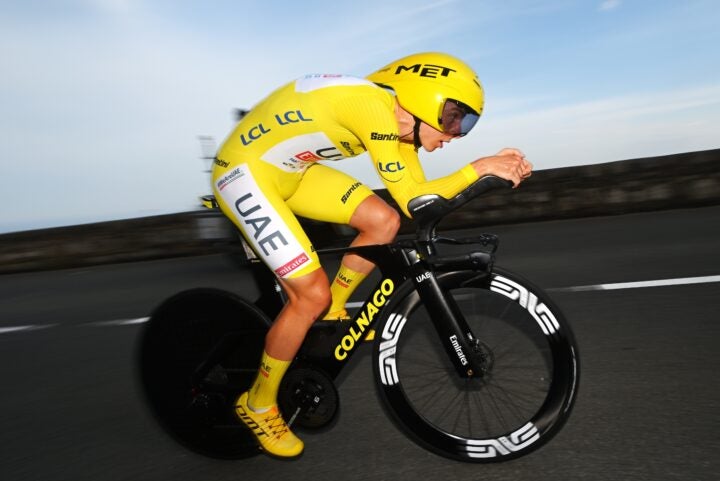
Just 3km into the stage was La Turbie, an 8.2km climb with an average gradient of 5.7 percent. After a short descent, the riders climbed Col d’Eze, a steep and punchy 1.6 km climb with an average gradient of 8.8 percent.
Gee was flying in the final time trial. With only a handful of riders to go, he set the fastest time on La Turbie. The Canadian pushed 446 watts for over 17 minutes, and the majority of the climb was spent in the time trial position. Pogačar went nearly a minute faster, pushing an estimated 7w/kg for 16:58.
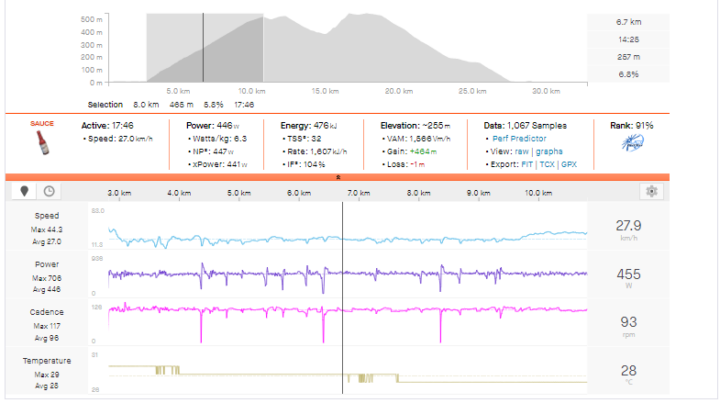
On the Col d’Eze, Gee did 483w (6.8w/kg) for 4:41, but he was still 29 seconds slower than Pogačar who pushed close to 8w/kg.
Pogačar – Stage 21 Time Trial Climbs
La Turbie
Time: 16:58
Average Power: 445w (7w/kg)
Col d’Eze
Time: 4:12
Average Power: 500w (7.9w/kg)
After three weeks of incredible racing, Tadej Pogačar won the Tour de France, more than six minutes ahead of Jonas Vingegaard. Remco Evenepoel finished third, over nine minutes down on Pogačar, and those were the only two riders within 19 minutes of the Slovenian.
Based on the numbers, Tadej Pogačar has an FTP close to 7w/kg. These are the highest numbers that we’ve ever seen in professional cycling, and what’s even more incredible is that Pogačar is pushing 7w/kg for 40 minutes after four hours of racing. Plus, they’re racing in the heat, and it’s the third week of a Grand Tour. Fatigue doesn’t seem to affect Pogačar, and it’s hard to imagine anyone beating him at his best. He was cruising in the final three stages of this year’s Tour, and he still won them all.
***
Power Analysis data courtesy of Strava
Strava sauce extension
Riders:
